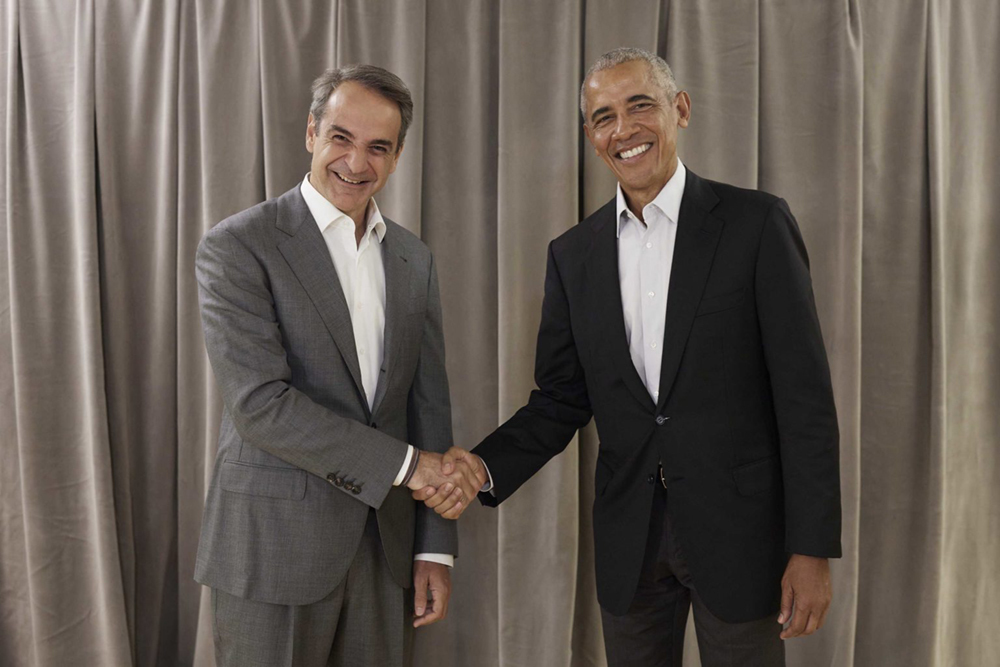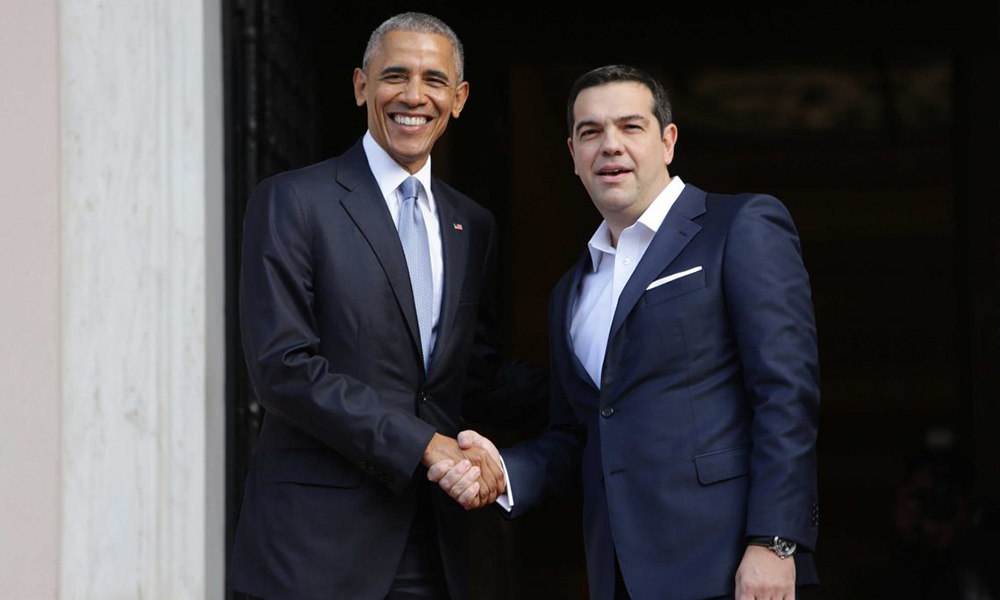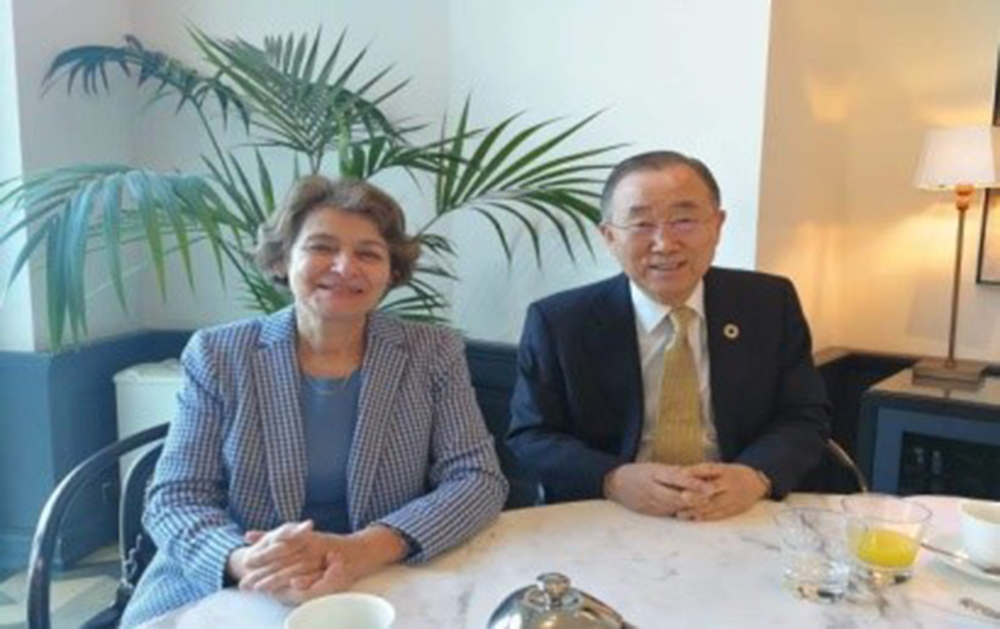The artist must elect to fight for freedom or slavery. I have made my choice. I had no alternative
(Paul Robeson)
In Athens, there are more gods than men.
(St. Paul)
Without health, life is diminished.
(Message inscribed on the parchment of the Athens School of Public Health1929)
Today, it is impossible to comprehend the magnitude of the health problems in Greece during the 19th century (1821-1832) which were much the same at the beginning of the 20th century (1918-1928). The first public health regulation was enacted in 1828 by John Capodistria the first Governor of Greece. However, what followed was great indifference in the progress of public health and little else happened until a century later following on from the Asia Minor disaster in 1922.
During the last visit of Barack Obama to Greece, I made efforts to get his attention and seek his help in saving the Athens School of Public Health (1929). This institution was set in motion by another great statesman, Eleftherios Venizelos, in response to the abysmal living conditions of the Greek people, which were said to be worse than those in Brazil. The Athens School of Public Health gave rise to a short-lived public health revolution.
The Athens School of Public Health, which took 25 years to establish, came into existence as a response to European concerns arising from a dengue fever pandemic originating in Syria in 1927. This pandemic had a mortality rate of 6% and affected a significant portion of the population. The League of Nations, specifically Ludwik Rajchman and M.D. Mackenzie, played a role in its formation. Unfortunately, in 2019, the socialist government terminated the Athens School of Public Health. This decision was executed without any protest from the medical establishment or outcry from the elite. Even the Academy of Athens chose not to acknowledge the school's demise.
The Athens School of Public Health achieved significant advancements in various areas. These include socio-economic development, the promotion of scientific culture, and the training of human resources in the fields of public health, sanitary engineering, and nursing. The school played a crucial role in the eradication of malaria and the control of tuberculosis. Additionally, it contributed to a gradual increase in life expectancy, which rose from 50 years in 1930 to 70 years in 1970.
However, the school also faced challenges and opposition. There was political opposition to public health initiatives and related policies, with many doctors considering them unnecessary, unsuccessful, and even detrimental. This opposition was fueled by the perception that public health efforts were a significant waste of money.
As Greece reached out for support from international health organizations such as the League of Nations and the Rockefeller Foundation to address endemic health problems, mainly malaria, aggravated by population movements, increasing numbers of refugees, and the spread of transmissible diseases, considerable friction arose between Greek experts and visiting or resident external experts. This friction, combined with a poorly educated and omnipresent bureaucracy, political favoritism, nepotism, and corruption in the public sector, led to an overall failure.
Advice from both Greek and foreign experts went unheard and disregarded. The influence of party politics, academic detachment, and medical opposition to public health significantly hindered progress. Two quotes paint a stark picture:
It is regrettable that in a place where hygiene, once revered as a goddess, flourished, no attention is paid to the teaching and application of public health science.
An angry curse grips all of Greece, and a vicious thirst plagues most cities. No one can claim that the problems of population health have been resolved, nor can the state assure us, its people, that health policy is triumphant.
Alexander Pappas, personal doctor to the prime minister, attempted to reconcile two opposing views when questioned by a journalist: "Why do we need the Athens School of Public Health when we have the Medical Faculty of the University of Athens?" "They are not the same!" Pappas proceeded to explain that the principles and practices of medical schools differ from those of schools of public health worldwide. He emphasized that being a doctor is one thing, while being a public health doctor is another. He provided clear definitions of medicine and public health, echoing earlier sentiments expressed by Greek experts that medical education alone is insufficient to possess the necessary knowledge to address population health.
During the Civil War, the Athens School was used as a police holding center. Additionally, during the Greek dictatorship of the Colonels, the Minister of Health entered a classroom, dismissed the professor, and proceeded to lecture the class. On its 60th anniversary, Melina Mercouri congratulated the school for its significant contributions to health and culture, and she noted that her grandfather was present at the official inauguration of the school as the Mayor of Athens.
Since its inception in 2009, the World Philosophical Forum in Athens has attracted prestigious individuals to its dialectical symposia. When promoting participation, we say:
Come to an eternal city where hospitality is still a virtue and a real part of everyday life. Take a walk through the streets of old Plaka, follow in the footsteps of St. Paul, and dine in a colorful tavern under the Acropolis.
Had I had contact with the ongoing second visit of Barack Obama to Greece (seven years after his first) and the first lady Michelle Obama's first visit, I would have invited them to a Council meeting of the Greek Branch of the World Philosophical Forum, taken them to the Secret School of the Greek Orthodox Church that helped keep the Greek language alive in Ottoman times, and treated them to a meal at the Abyssinian Café. Finally, I would have offered them Turkish, Byzantine, or Greek coffee according to their preference for sweetness, and served it with cheesecake. The grand finale would have involved a solemn reading of the future on the coffee grounds. Given the complexity of our world, seeking a second opinion from Pythia would have been considered. However, it was not meant to be.
Barack met with politicians and enjoyed an evening meal at the Stavros Niarchos Foundation (hosted by its President, Andreas Dracopoulos), whose generous grant supports civic engagement at the Obama Presidential Center in Chicago. He also delivered an inspiring speech at the remarkable and innovative Nostos conference. However, it is unfortunate that the conference did not incorporate a genuine Greek public health perspective, and no mention was made of the regrettable termination of the National School of Public Health in 2019. This omission would have been worthless.
Barack Obama's return addressed the role of mental health in strengthening democracy and supporting the next generation of leaders. However, it is notable that the WHO, despite highlighting the impending global surge of mental health problems, has yet to include a single classical philosopher on any committee, and this absence was also evident at the Nostos conference. There is a genuine need for a philosophy of health. Ancient Greece, indeed, showcased numerous avenues to health and well-being, all of which align with today's definition of health as not merely the absence of disease and infirmity, but the achievement of the highest level of physical, mental, and social well-being.
Barack Obama's statement emphasized that democracy is a challenging form of government because it requires coexistence with individuals who not only hold different ideas but may also possess completely opposing worldviews. In order for democracy to function effectively, he emphasized the need for all citizens to have the fundamental components of well-being. I would further emphasize that this necessitates the application of philosophy, including a philosophy of health.
Barack's remark about the importance of engaging in dialogue with those we disagree with appeared to be particularly relevant to Greece, where such communication is seldom practiced. This lack of dialogue was evident in the most recent elections. However, the President's conversation with Kyriakos Mitsotakis, the incoming Greek Prime Minister, led the latter to express genuine pleasure in communicating with the former President. The Prime Minister also highlighted the shared values that resonate strongly in Greece, the birthplace of democracy. He added, "I look forward to welcoming him again, and soon." In 2000, Jesse Jackson visited Belgrade during NATO bombardment, much to the chagrin of President Clinton. Nervously and apprehensively, Jesse Jackson looked up at the Belgrade sky, anticipating any incoming flight of a smart bomb while working towards the release of captured American prisoners. In 2004, Jesse Jackson engaged in discussions with the Cypriot Bishop of Kikou Monastery, Nikiforos, and the Greek Archbishop Christodoulos during the third annual World Meeting of Religions and Cultures in Athens. He walked up and around the Acropolis, visiting the spot where St. Paul preached to the Athenians. At one point, a small fire started in the dry grass, and Jesse helped put it out using a branch from an olive tree.
Two thousand years ago, during a time suspended between paganism and Christianity, the citizens of Athens were engaged in sharing and hearing about new ideas. St. Paul, angered by a city filled with idols, contemplated his Epistle to the Athenians. He declared, "I make known to you that God, the Christian God, has set a day when he will judge the world with justice." On the Areopagus, he addressed the men of Athens, acknowledging their religious inclinations. During his walk, he discovered an altar inscribed > "To an unknown God". Epimenides is credited with saving Athens from a great pestilence or plague through a sacrifice to an unknown god on this altar. Philosophers, who were no longer classical but rather agitated, sought to understand and comprehend the meaning of St. Paul's teachings. They questioned why he preached the merits of a foreign divinity and the concept of resurrection. In the following centuries, the New Testament would be written, the Olympic Games would fade away, Plato's Academy and its model for the modern university would be closed, and the Asclepiad would be replaced by shrines bridging the pagan and Christian worlds.
Jackson gave advice to Greece? America became great when it opened its doors to the world. Open your doors more to non-Greeks, expand your external markets, and draw strength from your history. Did he give advice to business leaders? Business leadership hinges on ethics and fairness... These are instrumental in meeting the highest expectations of people around the world and in Greece. They can help close the wealth and resource gap, reduce tensions, resolve conflicts, and seek peace and justice. If a business or government lacks ethical integrity, it cannot sustain profitability in the long run. His best advice was to never give up, even when faced with challenges. Utilize your fertile minds, strong bodies, and special spirits to achieve your dreams.
The Olympic Games reappeared in 1896, and the Dialectic Symposium emerged in 2009 with the establishment of the World Philosophical Forum by Igor Kondrashin, a Russian philosopher. This initiative received encouragement and support from a Greek academician who advised caution due to potential opposition from the academic world, which could undermine his efforts. At that time, the project had the backing of Irene Bokova and Ban Ki-moon. During Ban Ki-moon's last visit to Greece to examine migration, he was given a life jacket by the Greek authorities.
President Obama’s current visit was more relaxed but no less inspiring than his first. He was seen strolling down rugged, narrow island streets. admiring the dazzling architecture with a glass of white wine in his hand before returning to Athens. From the moment of his initial arrival in Athens, it was a case of cat and mouse with the media: spot the president, where’s Michelle? The first lady was easier to spot because of a photograph on Athenian buses advertising her bestselling book, Becoming. On their first evening in Athens, it was reported that the great actor Tom Hanks came to their defense. His role was to stall the insistent press, and with his experience reading the news and saving the girl, he was a good security choice.
The Obama visit unfolded against the backdrop of a dreadful drowning of immigrants when a ship carrying as many as 750 people from Libya to Italy capsized off the coast of Greece, as well as political electioneering with dysphonia running up to the elections (June 25, 2023). My cause is to reinvigorate classical philosophy and global citizenship, for which I hope Barrack's second visit will provide a positive knock-on value.
 Barack Obama pictured during his visit to Greece with Kyriakos Mitsotakis.
Barack Obama pictured during his visit to Greece with Kyriakos Mitsotakis.
 Barack Obama with Greek prime minister Alexis Tsipras at Maximos mansion.
Barack Obama with Greek prime minister Alexis Tsipras at Maximos mansion.
Barack Obama's second visit comes at a time when philosophy in Greece is marginalized and finds no place in the UN or support from the Greek world. Once again, my efforts to catch his ear have failed. It may have been an impossible dream. Despite my considerable efforts, I have not received a response to any of my appeals from the Greek world.
The Obama Foundation strongly believes in the promise and potential of the next generation of leaders, as does the World Philosophical Forum in Athens. Since its inauguration, when it captured the imagination of Ban Ki-moon and Irena Bokova, the Forum has been unable to elicit further responses from UNESCO, WHO, or the UN. This week, Athens welcomed nearly 100 Obama Foundation leaders who gathered to foster meaningful relationships across regions and sectors. The hope was that their time spent together in Athens would inspire, empower, and connect them in ways that would enable them to bring about positive change in their world. (Earlier this year, I had the opportunity to spend time with a group of students in the health field from Wisconsin through the American University of Greece.) Throughout the week, they had a once-in-a-lifetime opportunity to interact with President Obama, allowing him to listen to the challenges faced by these young leaders and learn about the opportunities, tools, and training they need to advance their work. Over the past few years, I have had the privilege of interacting with young leaders from Malaysia through the initiative of Eurasian Bridges for Peace. This initiative aims to promote a bilateral Silk Road, focusing on practical dimensions such as farming, fishing, and weaving, in order to improve well-being and ensure the sustainability of life. Additionally, it emphasizes the refinement of the mind through lifelong learning inspired by Socratic philosophy, incorporating innovative philosophical interpretations of the Quran.
In the year 2023, I had the opportunity to meet with 21 new enrollees who joined the outreach diploma course on philosophy and the Quran, which is being developed by Dr. Halo-N. I also had the pleasure of reconnecting with 14 graduates whom I have mentored and who are now undergoing training to become teachers.
Eurasian Bridges for Peace operates in parallel with the path set by Obama's vision of integrating humanity, originating from Chicago's South Side and now reaching Greece. The initiative was launched in Athens in 2016 and aims to facilitate a new global dialogue between Christianity and Islam, guided by the principles of equity and compassion. These principles are found in both the Holy Bible and the Quran. As a significant development, following the Inaugural Ceremony of Eurasian Bridges for Peace in Kuala Lumpur in 2022, Pope Francis decided to return several 2,500-year-old pieces of the Parthenon to Greece. These pieces had been part of the Vatican Museum's papal collections for over a century, demonstrating the possibility and potential for change.
What I learned from my early background is that it takes all kinds of people to make a world, and life is not always fair. When faced with difficulties, I have learned to respond by considering everything, reassuring myself that I'll be alright, and seeking knowledge to help navigate through challenges. The path to wisdom is often difficult and requires an open mind, education, and humor, but these qualities give us a fighting chance.
Based on my life's experiences, I firmly believe that if we acknowledge and embrace the fact that we are all made of the same clay, shaped by the same potter, and have evolved together, then respect for human rights will come naturally. This understanding can help reduce hate, bigotry, fear of the other, xenophobia, and racism.
During President Obama's anticipated third visit, the world will have undergone further changes, particularly with the increased integration of artificial intelligence (AI). As we move towards a future where our identities may be shaped and translated by AI, we must remain committed to investing in the next generation of emerging leaders. This commitment extends from Athens, Greece, to the south side of Chicago and Kuala Lumpur. I worry that in this world where social dementia is dominant, philosophy will become homeless and relegated to the status of having no fixed abode.
















